- Home
- Lauren Oliver
Replica Page 7
Replica Read online
Page 7
“Over here. That’s blood, boys.”
“Christ. Like a slug trail.”
“You bring any salt . . . ?”
She was afraid. Why was she afraid? She didn’t know. She wasn’t thinking clearly. The guards were on her side. They had kept the others out—they kept the replicas safe. But still fear had its hand down her throat. This was her chance to change her mind, to call out, to be rescued. 72 shifted next to her, and she stayed silent.
“Here’s one.” One of the men raised the cry and lights flashed again, dazzling over the dark water, as several other soldiers joined him where he stood. She wanted so badly to look—but even as she started to raise herself onto her elbow, 72 jerked her back to the ground.
“Stay put,” he whispered. She heard laughter from the soldiers, more words half blown by wind.
“Bring a—?”
“No point . . . dead . . .”
“No bodies . . . left . . .”
“It looks real, doesn’t it?”
Lyra was filled with a cold so deep it felt like a pit. It looks real, doesn’t it? She knew they’d found another replica—a dead one—and wondered what she would look like to them if they came across her with their flashlights: like something mechanical, a machine, or like a doll with moving parts. She imagined herself like a jigsaw puzzle—she had seen one, once, in the nurses’ break room—well-crafted, neatly jointed, but full of seams and cracks visible to everyone else. She wondered whether humans had some invisible quality, the truly critical one, she’d never be able to replicate.
They were coming closer, slowing through the water. Now she couldn’t have cried out even if she wanted to. Her lungs had seized in her chest. She had to grind her teeth to keep them from chattering.
“More blood over here, see?”
Lyra’s heart stopped. The men were just on the other side of the embankment. Their flashlights slanted through the grass—were they well enough concealed? Would they be seen?
“Keep an eye out for gators. These marshes are crawling.”
“Maybe we should give Johnson up for bait.”
More laughter. Lyra squeezed her eyes shut. Move on, she thought, still uncertain whether this was the right thing. All she knew was that she didn’t want them to see her. They couldn’t see her. Move on.
Then there was a horrible sucking, gasping noise, like water fighting through a stuck drain. For one confused second, Lyra couldn’t tell where it was coming from. Then she realized Cassiopeia was trying to speak.
“Help.” The word was mangled, distorted by the sound of liquid in her lungs.
“No, Cassiopeia,” Lyra whispered, dizzy now with panic. But already she knew it was too late. The soldiers had gone silent.
Cassiopeia spoke a little louder. “Help.”
“In here.” One of the men was already crashing through the trees toward them, and the marshes were once again alive with lights and shouting. “There’s someone in here.”
“Leave her. Leave her.” 72’s voice, when he whispered, was raw with panic. This time Lyra didn’t resist, didn’t even argue. 72 was going elbow over elbow into the tangle of growth. She crawled after him as fast as she could on her stomach. The ground trembled under the weight of the soldiers’ boots as she fought deeper into the growth. Pine needles grabbed her face and arms and scored tiny cuts in her skin. She was too scared to look back. She was certain they would be heard, crashing through the grass, but the soldiers were loud, calling to one another in a rapid patter she didn’t understand.
Then the trees released them into a heavy slick of puddled mud and water: they’d reached another sudden opening in the land, a place where the marsh became liquid. 72 slid into the water first and Lyra pulled herself in next to him just as a beam of light swept over the bank where she’d been. She slipped down to her chin, gasping a little, certain they must have heard her, and then submerged herself to her eyes. The beam of the light continued sniffing along the mud like something alive. Twelve inches from her, then ten . . .
“There’s a trail here,” one of the men called out, crashing through the growth, kicking aside the spindly branches lit up by his flashlight. Lyra knew they were finished. “Looks like something crawled out this way.”
The light inched closer, touching the water now, so close to her nose she drew back. . . .
“Found it.”
The light froze where it was. If it had truly been an animal it would have been close enough to lick her. Then the soldier on the bank turned and retreated in the other direction.
“Dead or alive?”
“What the fuck, alive.”
“Doesn’t look like it.”
How many were there? Three? Four? It was so hard to tell. How many were out there in the marshes with their lights and boots and heavy guns?
Cassiopeia spoke up one more time, faintly now. “Help me.”
“Awww, Jesus Christ. There’s blood all over the place. It got a bullet in the back or something.”
“Might as well put a bullet in the front, too. No way it’s gonna make it all the way to base.”
“Are you kidding? You know how expensive these things are to make? Might as well take a dump on a hundred grand.”
Beneath the surface, something slick and heavy brushed Lyra’s arm, and she stifled a scream. She wondered if even now there were alligators circling them in the dark, or snakes with sleek black bodies and poisonous fangs. High above them the stars glittered coldly in a perfectly clear sky.
“Damn it. All right then. On three?”
“You’re kidding, right? It’s bleeding. That’s how it spreads.”
“Not unless you eat them, you dumb shit. What’s the matter? You hungry?”
More laughter. There were definitely three of them. At least three. For the first time in her life, something black and deep and hateful stretched out of Lyra’s stomach. She hated them. She hated that they could laugh and that they were afraid to touch Cassiopeia. She hated their easy way of talking. She hated that she could look like a human, and yet she was not a human, and they could tell.
But just as quickly as it had come, the hatred passed. She was cold and tired and scared. She had no energy to be angry, too.
At least the soldiers were going, and leaving Cassiopeia behind after all.
“It’s already dead,” one of them said. “See? Let one of the cleanup crews get to it tomorrow.” There was the sound of a boot against a body, several hard thumps. Lyra sank down another inch in the water, as if she could flood the sound from her ears.
If there were alligators in the water, they could chew off her feet and she wouldn’t notice . . . or maybe her feet were already gone, maybe the pain had numbed her . . . the idea was so awful it struck her as funny. She might be standing there on two stumps, bleeding out into the swamp like Cassiopeia.
“It’s all right. They’re gone now.” In the darkness 72’s features were softened. Then she realized she’d been laughing out loud, laughing and shivering. The men were gone. The marshes were silent and still except for another helicopter that took off in the distance and swept out toward Barrel Key. She waded out of the water after him, slipping on the mud.
“What if they come back?” she asked, through the hard freeze in her chest. She knew it couldn’t really be cold. 72 didn’t seem cold at all, and the nurses had been complaining only yesterday about the awful heat. The cold must have somehow been inside, lodged in her chest like the piece of metal that got Cassiopeia in the back. She wanted to go and look at Cassiopeia, to make sure she was really dead. But she was so tired.
“They won’t be back,” he said. “They’ll finish searching the marshes, but they won’t come back, not for a while at least. Lie down,” he said, and she did, so tired that she didn’t even pull away when he lay down next to her. Already she was half-asleep, drowning in a tangled liquid dream. But when he put his arms around her, she jerked briefly awake.
“The human body,” he said, without letting go o
f her, his voice low and sleepy, “is full of nerve cells.”
“I know,” she said, reassured, “ten trillion of them.”
She was asleep again, and dreaming of ten trillion nerves lighting up like stars against a bloodred, pulsing sky.
Turn the page to continue reading Lyra’s story. Click here to read Chapter 8 of Gemma’s story.
NINE
SHE WOKE UP WARM, SWEATING, from a dream she couldn’t remember. The smell of smoke was fainter now. Her cheek was crusty with mud. The shock of what had happened had passed. She knew immediately where she was but not what had woken her. But something had woken her.
She sat up, wondering what time it was. Her body ached. She knew from the darkness it must still be the middle of the night. Beside her, 72 was sleeping with both hands folded beneath his head and his mouth open. He looked much younger when he slept.
Even before she heard a footstep she knew that someone was nearby and that this, the sound of someone close, was what had woken her. She took hold of 72’s arm, and he came awake at the same time she heard a girl speak.
“What now?” she said. “Do you think we can still get—?” But she abruptly fell silent, and Lyra realized she had made a sound without meaning to.
They must be more soldiers sent to comb the marshes. And yet the girl didn’t speak like a soldier, and wasn’t moving like one, either, with a fearlessness born from their guns. These people—she had no doubt they were people, and not replicas—were doing their best to stay quiet. Almost as if they, too, were afraid of being seen.
Who were they? What did they want?
72 was alert now, listening. The people—whoever they were—seemed to be just on the other side of the misshapen trees that grew all through the marshes; Nurse Don’t-Even-Think-About-It had said they were bad luck. Lyra and 72 had to move. She shifted into a crouch, and a twig snapped beneath her weight.
“Don’t move,” 72 whispered. “Don’t move.”
But it was too late. She heard crashing in the brush. In the darkness all the sounds were confused, and she didn’t know what had happened and whether they’d been found.
“Who’s there?” 72 called out. But no one answered.
Lyra stood up and plunged blindly in one direction, sliding a little on the mud, her own breath harsh and alien-sounding. Pain ripped through her heel where she stepped: the marshes were full of toothy things, plants and animals that bit back, a world of things that only wanted to draw blood, and for a second she was aware of the stars infinitely high above her, the distance and coldness of them, a long dark plunge into emptiness. There was nowhere to go, nowhere to run. In the world outside Haven she was nothing, had no past and no future.
Shadows moved on her left. Something heavy hit the ground, and the girl cried out.
Lyra froze. She’d run in exactly the wrong direction, straight toward the strangers and not away from them.
“Jesus. Jesus Christ.”
“That voice.” The girl spoke again. “Where did it come from?”
“I don’t know. Christ, Gemma. Look . . .”
Lyra heard coughing, as if someone was trying not to throw up. This, the evidence of side effects, calmed her. Maybe she’d been wrong. Maybe these were replicas who’d somehow escaped the way she did. She inched forward, parting the tangle of grasses with a hand, until she saw a boy silhouetted in the moonlight, his hand to his mouth, and the girl crouching beside him, whimpering.
“What the hell? What the hell?” he kept saying.
The moon broke loose of the clouds and clarified their features. Forgetting to be afraid, Lyra went forward.
“Cassiopeia,” she said, because she was confused, still half in shock. Of course the girl couldn’t be Cassiopeia, just like it couldn’t be any of her genotypes, 7–10: Cassiopeia was dead, and her genotypes didn’t have soft brown hair, soft everything, a pretty roundness to their faces and bodies. Lyra stopped again, seeing in the grass next to the girl the body, the slender ankles and familiar wristband, the blood darkening her shirt. Cassiopeia. And yet the girl crouching next to her had Cassiopeia’s face and round little nose and freckles. A genotype, then, like Calliope and Goosedown and Tide and Charmin, but one that Lyra didn’t know. Were replicas made in other places, too? It was the only thing she could think of that made sense.
The boy stumbled backward, as if he was afraid Lyra might attack him. The girl—Cassiopeia’s replica, identical to her except for the extra weight she carried and the hair that grazed her shoulders—was staring at Lyra, mouth open as though she was trying to scream but couldn’t.
Finally Cassiopeia’s replica said, “Oh my God. I think—I think she’s one of them.”
“Who are you?” Lyra managed to say. “Where did you come from?”
“Who are you?” The boy had a nice face, geometric, and she found it easy to look at him.
“Lyra,” she said, because she decided there was no point in lying. “Number twenty-four,” she clarified, because wherever they came from, they must have number systems, too. But they just stared at her blankly. She couldn’t understand it. She felt as she had when she had first started to read, staring at the cipher of the letters, those spiky evil things that kept their meaning locked away.
“Oh my God.” The girl brought a hand to her mouth. “There’s another one.”
Lyra turned and saw 72 edging out into the open, holding a knife. He must have stolen it from the kitchen before escaping, and she doubted it was very sharp, but the strangers didn’t know that. Now the boy had both hands out. Lyra thought he looked nervous. For a split second he reminded her of the nurses, and the narrow way they looked at the replicas, and she almost hoped that 72 would hurt him.
“Look,” he said. He wet his bottom lip with his tongue. “Hold on a second. Just hold on.”
“Who are you?” 72 came to stand next to Lyra. She couldn’t tell what he was thinking. His face, so open in sleep, had closed again, and she had never learned how to read other people’s moods and feelings, had never been taught to.
“We’re nobody,” the boy said. Slowly he helped the girl to her feet. She was wearing normal clothing, Lyra noticed. People-clothing. She understood less than ever. “Listen, we’re not going to hurt you, okay? My name’s Jake Witz. This is Gemma. We got lost in the marshes, that’s all.”
Lyra was now more confused than ever. “But . . .” She met the girl’s eyes for the first time. It was hard to look at her with Cassiopeia, poor Cassiopeia, lying dead at her feet between them. Who would come to collect her body? Who would bundle her up for burning? “Who made you?”
“What?” the girl whispered.
“Who made you?” Lyra repeated. She’d never heard of other places like Haven, and she felt a small stirring of hope, as if a heavy locked door in her chest had just been unlatched. Maybe there were places for them to go after all, places where there were people to take care of them like they’d been cared for at Haven, places with high walls to keep everyone else out.
“I—I don’t understand,” the girl said. Her eyes were so wide Lyra could see a whole portion of the night sky reflected in them.
“You’re a replica,” Lyra said impatiently. The girl was slow, much slower than Cassiopeia. But she knew that this wasn’t uncommon. She thought of Lilac Springs—dead now, probably. And 101, who’d never even learned how to hold a fork. She wondered how many of the others had burned.
“A what?” the girl whispered.
“A replica,” Lyra repeated. The girl shook her head. Where she came from, they must be called something different. She recited, “An organism descended from or genetically identical to a single common ancestor.”
“A clone,” the girl said, staring at Lyra so fixedly she was reminded of being under the observation lights, and looked away. “She means a clone, Jake.”
“Yeah, well. I kind of already had that impression,” the boy said, and he made a face, as if he was offended by the sight of Cassiopeia’s body.
; Lyra had the sudden urge to reach down and close Cassiopeia’s eyes and wasn’t sure where it had come from—maybe something one of the nurses had said about the way people buried one another. In Haven, the dead replicas had always simply been burned or dumped.
“But—but it’s impossible.” The girl’s voice had gotten very shrill. “It’s impossible, the technology doesn’t exist, it’s illegal. . . .”
Lyra lost patience. The girl was either suffering from side effects or she was very, very stupid to begin with. Failure to thrive. “It’s not impossible,” she said. “At Haven, there were thousands of replicas.”
“Jesus.” The boy closed his eyes. His face was like a second moon, pale and glowing. “Clones. It all makes sense now. . . .”
“Are you crazy? Nothing makes sense.” The girl had turned away, covering her mouth with her hand again, as if she was trying to force back the urge to be sick. “There’s a dead girl with my face on her. We’re standing here in the middle of the fucking night and these—these people are telling me that there are clones running around out there, thousands of them—”
“Gemma, calm down. Okay? Everyone needs to calm down.” The boy spoke loudly even though the girl was the only one who wasn’t calm, or the only one who was showing it, at least. “Can you put that thing down, please?” This was to 72, still holding the knife. “We’re not going to hurt you.”
Suddenly Lyra was hit with a wave of dizziness. She went into a crouch and put her head between her knees. Her head was full of a hot and sticky darkness, a swirling that reminded her of heavy clouds of circulating gnats.
“What’s the matter with her?” She heard the girl’s voice, but distantly. If 72 responded, she didn’t hear him.
“Hey.” A minute later, the girl was next to her. “Are you okay?” She put a hand on Lyra’s back, and Lyra jerked away. She was used to being touched, manipulated, even opened up with knives and needles; but this felt different, intimate and almost shameful, like when she’d first been caught by Nurse-Don’t-Even-Think-About-It in the bathroom with her hands submerged in bleach, trying to scrub her first period blood from her underwear. She couldn’t speak. She was afraid that if she opened her mouth, she would throw up. The girl stood up again and moved away from her, and Lyra almost regretted jerking away. But she didn’t want to be touched by strangers, not anymore, not if she could help it.

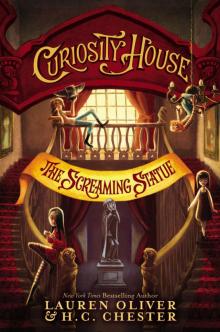 The Screaming Statue
The Screaming Statue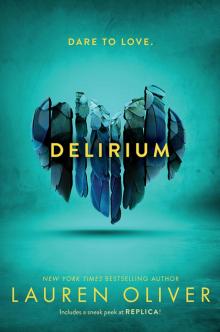 Delirium
Delirium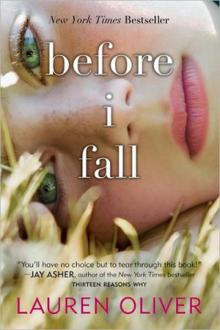 Before I Fall
Before I Fall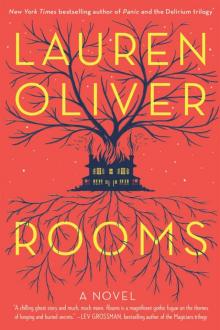 Rooms
Rooms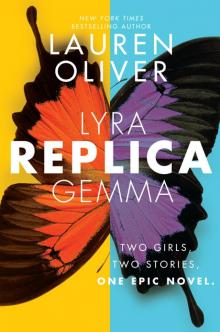 Replica
Replica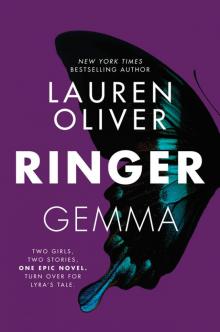 Ringer
Ringer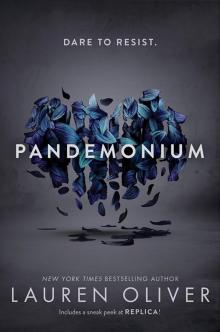 Pandemonium
Pandemonium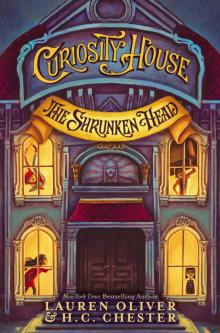 The Shrunken Head
The Shrunken Head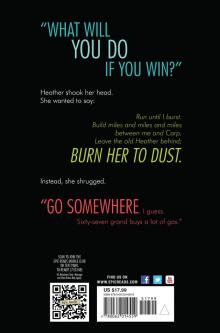 Panic
Panic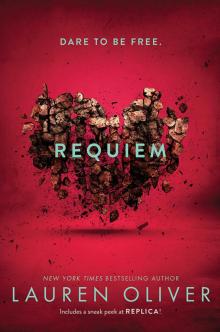 Requiem
Requiem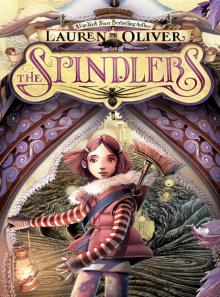 The Spindlers
The Spindlers Annabel
Annabel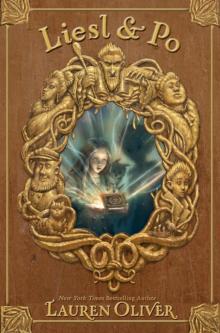 Liesl & Po
Liesl & Po Raven
Raven Alex
Alex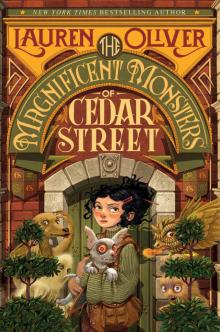 The Magnificent Monsters of Cedar Street
The Magnificent Monsters of Cedar Street Vanishing Girls
Vanishing Girls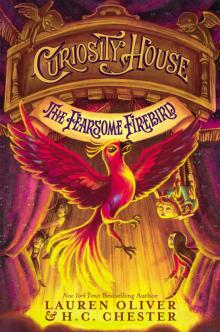 The Fearsome Firebird
The Fearsome Firebird Raven: A Delirium Short Story
Raven: A Delirium Short Story Annabel: A Delirium Short Story
Annabel: A Delirium Short Story Hana: A Delirium Short Story
Hana: A Delirium Short Story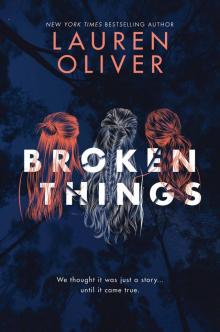 Broken Things
Broken Things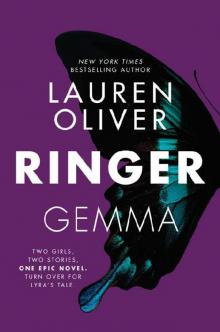 Ringer (Replica)
Ringer (Replica) Alex (delirium)
Alex (delirium)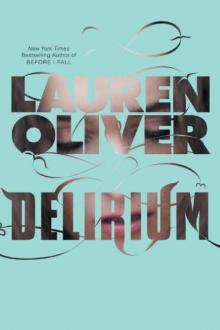 Delirium dt-1
Delirium dt-1